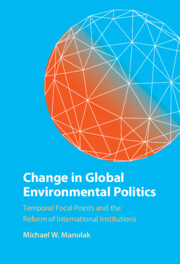 Change in Global Environmental Politics
Change in Global Environmental Politics Published online by Cambridge University Press: 12 May 2022
This chapter focuses on the environmental diplomacy surrounding the World Commission on Environment and Development, popularly known as the “Brundtland Commission.” This process popularized the concept of sustainable development. The chapter begins by detailing the substantial changes seen in international environmental conditions through the mid-1980s, brought about largely by the Third World Debt crisis. These shifts created a rapidly deteriorating global environmental context and necessitated significant changes in institutional arrangements. The need for institutional change was a central finding of the important 1987 “Brundtland report,” titled Our Common Future. The Brundtland Commission highlighted a rapid deterioration in the world environment and underlined the need for major institutional change. Some actors sought to realize such change at the United Nations General Assembly in 1987, when the report and its call for action were presented to world leaders. Coordination was hindered, however, by divergent expectations and the absence of a Temporal Focal Point. While states were incentivized to cooperate rapidly to address problems in global environmental governance, the institutional status quo prevailed.
To save this book to your Kindle, first ensure [email protected] is added to your Approved Personal Document E-mail List under your Personal Document Settings on the Manage Your Content and Devices page of your Amazon account. Then enter the ‘name’ part of your Kindle email address below. Find out more about saving to your Kindle.
Note you can select to save to either the @free.kindle.com or @kindle.com variations. ‘@free.kindle.com’ emails are free but can only be saved to your device when it is connected to wi-fi. ‘@kindle.com’ emails can be delivered even when you are not connected to wi-fi, but note that service fees apply.
Find out more about the Kindle Personal Document Service.
To save content items to your account, please confirm that you agree to abide by our usage policies. If this is the first time you use this feature, you will be asked to authorise Cambridge Core to connect with your account. Find out more about saving content to Dropbox.
To save content items to your account, please confirm that you agree to abide by our usage policies. If this is the first time you use this feature, you will be asked to authorise Cambridge Core to connect with your account. Find out more about saving content to Google Drive.